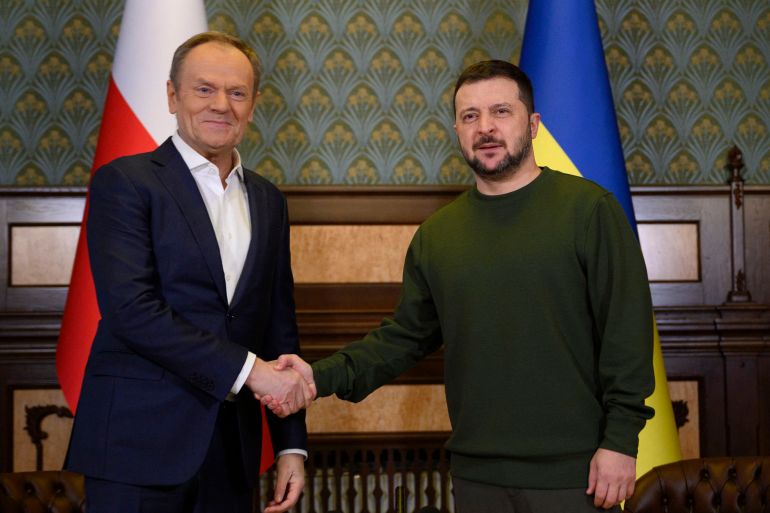Poland’s Tusk says Ukraine-Russia war a fight ‘between good and evil’
Donald Tusk meets President Volodymyr Zelenskyy in Kyiv as Ukraine’s war with Russia nears two years.

Poland’s Prime Minister Donald Tusk has promised to keep supporting Ukraine against Russia’s invasion and to resolve differences between Warsaw and Kyiv over grain shipments and trucking that soured ties between the neighbours.
“Poland will do everything to increase Ukraine’s chances of victory in this war,” Tusk said at a joint media briefing with Ukraine’s President Volodymyr Zelenskyy in Kyiv on Monday.
Keep reading
list of 4 itemsPoland’s new PM promises to push for full Western support of Ukraine
Polish truckers agree to suspend border protest
Russia-Ukraine war: List of key events, day 698
“I am not ashamed to use these big words: it is here, in Ukraine, that the world front between good and evil runs,” he added.
Tusk and Zelenskyy also hailed plans between their countries for joint arms production.
On the social media platform X, Zelenskyy said that they had discussed “a new form of cooperation aimed at larger-scale arms purchases for Ukrainian needs.”
Today, we had very productive talks in Kyiv with @DonaldTusk about all aspects of Ukrainian-Polish bilateral relations.
We appreciate Poland's unwavering support and the new military aid package for Ukraine, as well as a new form of cooperation aimed at larger-scale arms… pic.twitter.com/m5QCm67acD
— Volodymyr Zelenskyy / Володимир Зеленський (@ZelenskyyUa) January 22, 2024
Warsaw has emerged as a key ally for Kyiv as it defends itself against Russia and seeks more financial and military support from Western partners. Poland has also taken in more than one million Ukrainian refugees.
Relations between the two had deteriorated last year as economic competition from Ukrainian food producers and truckers angered Poles who said their livelihoods were under threat.
Polish farmers and truckers blocked border crossings, causing backups and threatening the flow of some aid to Ukraine.
Polish farmers complained that imports of Ukrainian foods had caused prices to fall, hurting their incomes, while truckers said they were being undercut by their Ukrainian counterparts.
The issue surfaced during the war as Ukrainian ports were blocked and food producers turned to road routes through Europe to get their products to market.
The Polish truckers agreed last week to suspend protests, which had been aimed at revoking Ukrainian truckers’ permit-free access to the European Union, until March 1.
“There are some conflicts of interest, we know it well, and we will talk about them, but not only in the spirit of friendship, which is obvious, but with the attitude to solve these problems as soon as possible, not to maintain or multiply them,” Tusk said, according to comments released by his office.
Tusk’s visit coincides with Ukraine’s Unity Day holiday, which celebrates the unification of western and eastern Ukraine in 1919.
The visit also came as Zelenskyy announced draft legislation that could pave the way for foreigners fighting against Russia in his country to receive Ukrainian citizenship. The bill would formally allow Ukrainians to gain dual citizenship, with the exception of Russia.
Thousands of foreigners rushed at the beginning of Russia’s invasion of Ukraine to help fend off Moscow’s forces trying to wrest control of the country and topple Ukraine’s leadership.
Meanwhile, the Kremlin on Monday blamed Ukraine for an attack that started a fire over the weekend at a gas terminal at the Baltic port of Ust-Luga, more than 850km (530 miles) from the Ukraine border.
The gas facility belonging to Novatek, Russia’s largest exporter of liquefied natural gas (LNG), was set ablaze on Sunday in the western port town, close to Russia’s border with Estonia.
“The Kyiv regime continues to show its bestial face. They are striking civil infrastructure, people,” Kremlin spokesperson Dmitry Peskov told reporters on Monday when asked about the incident.
Tusk’s visit came a day after Moscow-installed officials in eastern Ukraine reported that Ukrainian shelling killed at least 27 people on the outskirts of a Russian-occupied city.
Peskov called the shelling outside Donetsk a “monstrous terrorist act”. The Ukrainian military denied it had anything to do with the attack. The two sides’ claims could not immediately be verified.
Ukraine’s allies have in recent weeks sought to reassure the country that they are committed to its long-term defence against the Kremlin’s forces amid concerns that Western support could be sagging.
British Prime Minister Rishi Sunak and France’s new Foreign Minister Stephane Sejourne also travelled to Kyiv recently.